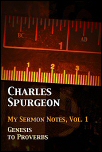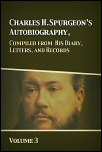Select Works of Charles Spurgeon (66 vols.)
Digital Logos Edition
Overview
Charles Spurgeon is one of the church’s most famous preachers and Christianity’s most prolific writers. During his decades-long ministry in nineteenth century England, Spurgeon preached thousands of sermons, heard by millions of listeners. He devoted his life to the clear exposition of the Bible, and led the Metropolitan Tabernacle to become the largest church of its time. More than one hundred years after his death, Charles Spurgeon continues to exert powerful influence in the church and around the world. He remains a model preacher for pastors of every age.
Charles Spurgeon was born in Kelvedon, Essex, England on June 19, 1834. He converted to Christianity in 1850, and began his ministry of preaching and teaching immediately—preaching more than 500 sermons by the age of twenty! He read six books per week during his adult life, and read Pilgrim’s Progress more than 100 times. In addition to his studying and preaching, Spurgeon also founded the Pastor’s College (now Spurgeon’s College), various orphanages and schools, mission chapels, and numerous other social institutions.
The 86-volume Charles Spurgeon Collection from Logos Bible Software contains material not published in Spurgeon’s best-selling multivolume collection of sermons. This includes Spurgeon’s commentaries, lectures, autobiography, the Sword and the Trowel, and much more.
What’s more, the Logos edition makes Spurgeon’s important books and commentaries more widely available and easier to access than ever! From the countless Scripture references linked straight to the biblical text, to the powerful search tools in your digital library, the Logos edition lets you encounter Spurgeon like never before. Logos also makes navigating lengthy, multi-volume works easier than ever—such as Spurgeon’s Treasury of David and numerous issues of The Sword and the Trowel. The Charles Spurgeon Collection is a must-have for pastors and teachers, and anyone interested in studying one of the church’s most important preacher and most prolific writer.

- The Treasury of David, Spurgeon’s 6-volume commentary on the Psalms
- Spurgeon’s 4-volume Lectures to My Students, which includes his best-selling Commenting and Commentaries
- Spurgeon’s 4-volume Sermon Notes
- The 2-volume Salt Cellars
- Spurgeon’s 4-volume Autobiography, the first and most detailed account of Spurgeon’s life and ministry
- A collection of Spurgeon’s letters and correspondence
- Dozens of additional volumes on preaching, prayer, evangelism, and much more!
I have turned to Charles Spurgeon in these days for help, and I have not been disappointed. . . . I think the word "indefatigable" was created for people like Charles Spurgeon.
With whom among men can you compare [Spurgeon]? He combined the preaching power of Jonathan Edwards and Whitefield with the organizing power of Wesley, and the energy, fire, and courage of Luther.
—B. H. Carroll
Some of earth's great ones have no doubt sunk into oblivion, but among those whom history remembers only those are great whom history greatens. Spurgeon is among that number.
—W. Y. Fullerton
There was no voice in the Victorian pulpit as resonant, no preacher as beloved by the people, no orator as prodigious as Charles Haddon Spurgeon.
—Hughes Oliphant Old
Spurgeon combined oratorical prowess and evangelistic fervor with a deep concern for social issues . . . . Despite both his fame and his larger-than-life talent, Spurgeon retained a sense of reverence for the responsibility and act of preaching.
—Richard Lischer
Charles Haddon Spurgeon is one of evangelical Christianity’s immortals.
- Title: Charles Spurgeon Collection
- Author: Charles Haddon Spurgeon
- Volumes: 66
- Resources: 64
- Format: Digital > Logos Research Edition
- Resource ID: {C56DA8B9-4E1A-41A2-9A97-61B04531C6AF}

The Treasury of David, Volume 2: Psalms 27–57
- Publisher: Marshall Brothers
- Publication Date: 1869
- Pages: 487

The Treasury of David, Volume 3: Psalms 58–87
- Publisher: Marshall Brothers
- Publication Date: 1869
- Pages: 490

The Treasury of David, Volume 4: Psalms 88–110
- Publisher: Marshall Brothers
- Publication Date: 1869
- Pages: 479

The Treasury of David, Volume 5: Psalms 111–119
- Publisher: Marshall Brothers
- Publication Date: 1869
- Pages: 479

The Treasury of David, Volume 6: Psalms 120–150
- Publisher: Marshall Brothers
- Publication Date: 1869
- Pages: 470
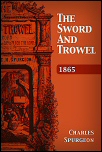
The Sword and Trowel: 1865
- Publisher: Passmore and Alabaster
- Publication Date: 1865
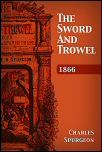
The Sword and Trowel: 1866
- Publisher: Passmore and Alabaster
- Publication Date: 1866
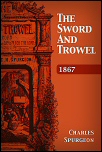
The Sword and Trowel: 1867
- Publisher: Passmore and Alabaster
- Publication Date: 1867
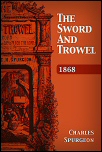
The Sword and Trowel: 1868
- Publisher: Passmore and Alabaster
- Publication Date: 1868
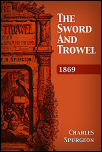
The Sword and Trowel: 1869
- Publisher: Passmore and Alabaster
- Publication Date: 1869
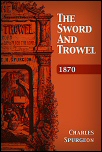
The Sword and Trowel: 1870
- Publisher: Passmore and Alabaster
- Publication Date: 1870
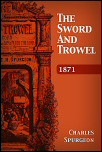
The Sword and Trowel: 1871
- Publisher: Passmore and Alabaster
- Publication Date: 1871
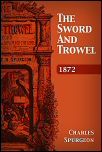
The Sword and Trowel: 1872
- Publisher: Passmore and Alabaster
- Publication Date: 1872
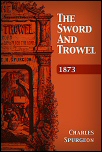
The Sword and Trowel: 1873
- Publisher: Passmore and Alabaster
- Publication Date: 1873
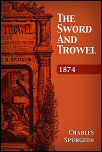
The Sword and Trowel: 1874
- Publisher: Passmore and Alabaster
- Publication Date: 1874
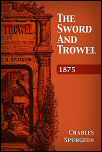
The Sword and Trowel: 1875
- Publisher: Passmore and Alabaster
- Publication Date: 1875
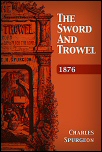
The Sword and Trowel: 1876
- Publisher: Passmore and Alabaster
- Publication Date: 1876
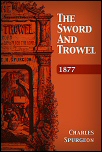
The Sword and Trowel: 1877
- Publisher: Passmore and Alabaster
- Publication Date: 1877
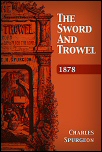
The Sword and Trowel: 1878
- Publisher: Passmore and Alabaster
- Publication Date: 1878
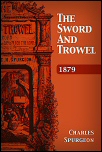
The Sword and Trowel: 1879
- Publisher: Passmore and Alabaster
- Publication Date: 1879
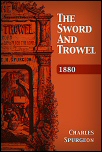
The Sword and Trowel: 1880
- Publisher: Passmore and Alabaster
- Publication Date: 1880
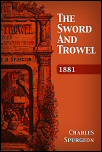
The Sword and Trowel: 1881
- Publisher: Passmore and Alabaster
- Publication Date: 1881
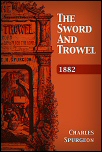
The Sword and Trowel: 1882
- Publisher: Passmore and Alabaster
- Publication Date: 1882
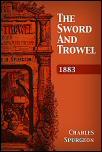
The Sword and Trowel: 1883
- Publisher: Passmore and Alabaster
- Publication Date: 1883
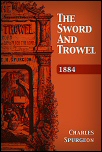
The Sword and Trowel: 1884
- Publisher: Passmore and Alabaster
- Publication Date: 1884
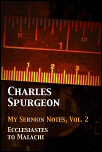
My Sermon Notes, Volume 2: Ecclesiastes to Malachi
- Publisher: Passmore and Alabaster
- Publication Date: 1884
- Pages: 392
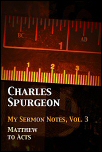
My Sermon Notes, Volume 3: Matthew to Acts
- Publisher: Passmore and Alabaster
- Publication Date: 1884
- Pages: 200
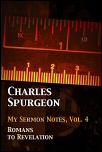
My Sermon Notes, Volume 4: Romans to Revelation
- Publisher: Passmore and Alabaster
- Publication Date: 1884
- Pages: 400

The Salt Cellars, Volume 2
- Publisher: Passmore and Alabaster
- Publication Date: 1889
- Pages: 367

In Lectures to My Students, Spurgeon has written the ultimate how-to guide for preachers. This volume covers the basics of preaching, such as the nuts-and-bolts of choosing a text and composing a sermons. Spurgeon, the master orator, also advises students on the mechanics of spontaneous sermons and impromptu speech, admitting that such a talent takes time and effort. He also laments that pastors often find themselves out of place—“speckled birds,” in his words—unable to conduct themselves in ordinary social circumstances. This practical guide will be of enormous benefit to pastors and preachers.

Spurgeon compiled a second volume of Lectures in response to the overwhelmingly positive reception of his first volume. This volume contains detailed lectures on the role of the Holy Spirit during sermon preparation and delivery. Spurgeon also writes at length about the practical mechanics of sermon delivery, such as vocal inflection, hand gestures, eye contact, and attention to posture.

Volume three of Spurgeon’s Lectures teaches preachers how to use illustrations and stories within their sermons. Preaching, at its most basic level, helps the congregation find their place in the narrative arc of Scripture, making storytelling an integral component. This volume reveals Spurgeon’s method of artfully integrating illustrations and stories into his sermons, along with other creative ways to make the text come alive. That thousands returned each week to hear Spurgeon preach testifies to the remarkable success of Spurgeon’s method.

Commenting and Commentaries, the fourth volume of Spurgeon’s Lectures to My Students, has become one of the most widely accessed and cited reference works on Bible commentaries. Spurgeon judged too many sermons as “flashy, rather than fleshy; clever, rather than solid; entertaining, rather than impressive.” He pleaded for more expository preaching, and for more preachers equipped to expound the Word. Spurgeon compiled this volume of commentaries to help preachers select and employ commentaries for the study of Scripture and the preaching of the World.
Spurgeon was a voracious reader. During his lifetime, he read thousands of books and acquired familiarity with astounding number of commentators. This volume contains notes and background information for thousands of volumes of commentary on Scripture, along with detailed introductions to many of the most important commentators, including Matthew Henry, John Calvin, Matthew Poole, John Trapp, John Gill, Adam Clarke, Albert Barnes, John Kitto, John Albert Bengel, Henry Alford, and others. He also urges pastors to read diligently, and use concordances wisely. This practical volume is a must-have for pastors, teachers, and anyone seeking a guide to the countless volumes written on Scripture.
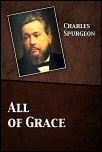
The thrust of the New Testament, and the central aspect of the Gospel, is one of grace. Throughout his career as a preacher and teacher, Spurgeon reflected on God’s grace. The best-selling All of Grace contains chapters on justification, forgiveness, faith, the regeneration of the Holy Spirit, and much more. Since its first publication more than a century ago, All of Grace has sold more than one million copies!
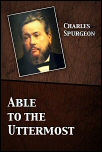
Throughout his lifetime, Spurgeon preached thousands of sermons. Able to the Uttermost contains twenty sermons on a variety of topics, taken from manuscripts not discovered until after Spurgeon’s death. These sermons are not found in the The New Park Street Pulpit or the The Metropolitan Tabernacle Pulpit.
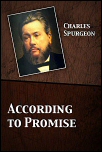
This sequel to All of Grace contains an additional twenty sermons and addresses. Whereas the first volume introduces readers to grace, these sermons explain the promise of grace—the content of the promise, the work of the Holy Spirit, and the words of Jesus regarding the implications for the future.
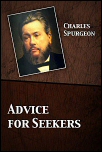
Advice for Seekers
- Publisher: Passmore and Alabaster
- Publication Date: 1896
- Pages: 45
This volume contains practical and helpful explanations of salvation. Although themes of grace permeate the whole of Spurgeon’s writing, it is the special focus of Advice for Seekers. Spurgeon draws from the life of Jesus and the full range of Scriptural teaching on grace to convince seekers of the benefits of salvation.
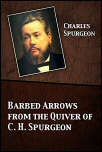
In Barbed Arrows, the enormous amount of content in Spurgeon’s preaching and writing has been condensed and organized by topic. From anecdotes, short stories, and insightful quotations, Barbed Arrows contains the most quotable and most accessible compilation of Spurgeon’s preaching and writing available anywhere.
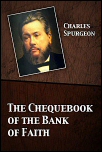
Spurgeon uses a checkbook as a metaphor for the promises of God—promises endorsed by God and accepted as our own. The Chequebook of the Bank of Faith contains daily readings designed to encourage believers, using Scripture, personal testimony, and stories from Spurgeon’s own life.
First written in the 1890s, Daily Help received enthusiastic support, and gained wide acceptance for devotional use. This volume includes a reading for each day, in which Spurgeon reflects on Scripture passages, prayer, and theological topics. It is accessible, readable, and employs the extensive use of illustrations and storytelling to make the text of Scripture come alive. Daily Help engages readers in Scripture every day of the year.
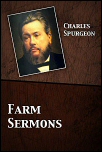
Agricultural metaphors permeate Scripture. In Genesis, we learn of Abel tending flocks and Cain working the fields. In the Psalms we read of God’s creation—plants, animals, and the variety of life. Jesus told parables of sowing and harvesting. Today, the church still uses such metaphors—planting the seed of the Gospel in the hearts of others.
Charles Spurgeon, keenly aware of the prominence of agriculture both in the Bible and in his own congregation, wrote and preached sermons specifically for farms. Farm Sermons contains nineteen sermons which draw from texts in the Bible on farming, harvesting, and working in nature.

A companion volume to Barbed Arrows from the Quiver of C.H. Spurgeon, this volume contains additional illustrations and notes jotted down by Spurgeon himself on his travels. Feathers for Arrows includes hundreds of metaphors, stories, and other anecdotes not found in his sermons, along with additional clippings from Spurgeon’s favorite writings.
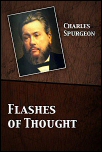
Flashes of Thought was originally intended for his original listeners looking to revisit important points of his sermons. Today, this volume reveals the striking and suggestive elements of Spurgeon’s vast corpus of lectures, addresses, and sermons. Flashes of Thought contains 1,000 thought-provoking excerpts from Spurgeon’s preaching, newly organized for quick reference.
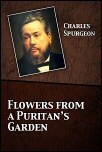
Spurgeon was deeply influenced by Puritan writings, and especially Thomas Manton’s commentary on Psalm 119. Spurgeon praised Manton for his clear and sound exposition of Scripture. In Flowers from a Puritan’s Garden, Spurgeon acknowledges his indebtedness to his spiritual heritage in the Puritan. This book contains excerpts from Puritan writings, along with reflections and commentary from Spurgeon himself.

George Fox: An Address Delivered to the Society of Friends contains Spurgeon’s address on November 6, 1866 to the Society of Friends. George Fox was the founder of the Society of Friends and lived through the English Civil War. Spurgeon acknowledges not only the theological influence of Fox, but also the lasting impact of the Quakers in social matters.
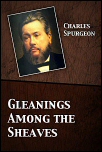
Gleanings among the Sheaves, one of Spurgeon’s earliest publications, contains more than one hundred meditations and short reflections on diverse topics, including prayer, beauty, poverty, faith, and doubt. He also writes at length on religion as a personal matter. Some reflections are brief; others longer; but all have resulted from extended thought and reflection.
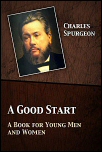
Throughout his decades-long ministry, Spurgeon’s greatest aim was to lead people to Christ, and children were no exception. A Good Start contains messages on character formation and spiritual growth. He warns children against the dangers and pitfalls which can derail their faith, and offers accessible and practical advice.
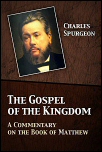
Spurgeon’s commentary on the entire book of Matthew, The Gospel of the Kingdom was written during the final years of his life. He died before seeing a final proof of the manuscript, and did not live to see the popularity of his commentary. This verse-by-verse commentary on the entire Gospel of Matthew is written with the same elegance characteristic of The Treasury of David, his commentary on Psalms. He shows that the concept of God’s Kingdom predominates throughout the narrative structure of the book, and reveals a unique revelation of Jesus’ ministry.
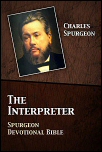
The Interpreter: Spurgeon Devotional Bible contains the text of the entire Bible, along with Spurgeon’s reflections on nearly every verse. This Bible, arranged topically instead of canonically, allows readers to experience the text of Scripture along with Charles Spurgeon himself. His commentary illuminates the texts, and provides notes on interpretation and application of the Bible.
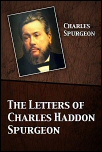
The Letters of Charles Haddon Spurgeon
- Publisher: Marshall Brothers
- Publication Date: 1923
- Pages: 224
Spurgeon led a public life—his books were widely read, he preached before thousands of people each week, he was one of the most prolific writers in the history of Christianity. The Letters of Charles Haddon Spurgeon reveals the private side of Spurgeon and his ministry. This volume contains letters from Spurgeon to friends, relatives, and members of his church. It also includes letters to the editors of newspapers and periodicals. Spurgeon’s correspondence discusses theology, personal matters, the church, the work of his colleagues, and much more.
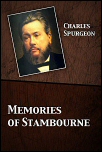
Charles Spurgeon traveled to Stambourne in the spring of 1891 during an extended illness. Stambourne held special meaning for Charles Spurgeon, because his grandfather, James Spurgeon, had served as pastor in the city. This retreat provided an opportunity for reflection on the village and the meaning of the surrounding countryside. Memories of Stambourne contains anecdotes on the people and places of the village, and amounts to a concise history of the region from Spurgeon’s perspective.
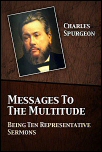
Message to the Multitude is among the last of Spurgeon’s literary works. Spurgeon edited this volume during the closing weeks of his life, and it was published after his death. He chose these sermons because they display Spurgeon’s clear style, his adherence to the biblical text, and a full range of illustrations, stories, and metaphors.
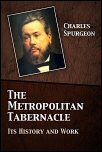
The history of the Metropolitan Tabernacle—the church, for many years, at the center of Spurgeon’s preaching ministry—reaches back nearly four centuries, long before Spurgeon’s popularity solidified its place in church history. Since 1650, preachers such as Benjamin Keach, John Gill, and others have spoken from behind its pulpit. The church first formed despite an act of Parliament prohibiting its existence, and through the years became a center of Baptist thought and known for its influential preachers. The Metropolitan Tabernacle: Its History and Work tells the history of the church from Spurgeon’s unique perspective.
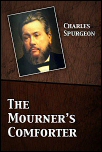
The Mourner’s Comforter
- Publisher: Passmore and Alabaster
- Publication Date: 1878
- Pages: 224
Pain and sorrow are part of the Christian life—a fact recognizable since the Psalmist composed words of lament, and acknowledged in Spurgeon’s volume on the subject. In The Mourner’s Comforter, Spurgeon looks to the words of Isaiah to address the most difficult of human emotions. Isaiah, although an Old Testament prophet, anticipates the message of the Gospel—that Christ meets our needs—and speaks powerfully to those who mourn.
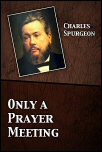
Only a Prayer Meeting contains forty addresses designed to help pastors and prayer leaders. These addresses—first delivered for the prayer meetings of the Metropolitan Tabernacle—are devoted to a Scriptural exposition of prayer, and draw from the full range of passages on the topics. Spurgeon also addresses the confession of sin, and illustrates the efficacy of prayer.
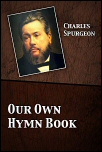
For years, the congregation at the Metropolitan Tabernacle used two hymnals—one compiled by John Rippon and the other by Isaac Watts. The confusion caused by two hymnals prompted the church to compile this new hymnal during the years of Charles Spurgeon. Our Own Hymn Book reflects the sentiments of the church and Spurgeon’s influence. It contains the texts of hundreds of hymns, plus metrical arrangements of all 150 Psalms.
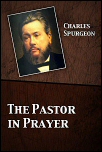
The Pastor in Prayer
- Publisher: Elliot Stock
- Publication Date: 1893
- Pages: 428
Spurgeon’s prayers reveal a pastor in deep communion with God. The Pastor in Prayer contains an extensive collection of Spurgeon’s prayers—some written, but many extemporaneous. The Pastor in Prayer articulate Spurgeon’s theology perhaps more than any other volume. Through pleading intercession and devout confession, Spurgeon’s prayers help readers understand God using his own intimate words.
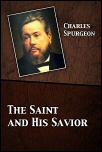
In The Saint and His Savior, Spurgeon has written what amounts to a basic introduction to the experience of God. He writes on the subject of religious experience, dealing in particular with the experience of beginning Christians. Spurgeon offers counsel “to comfort the mourner, to confirm the weak, to guide the wandering, and reassure the doubting.”
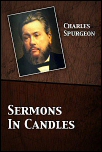
In Sermons in Candles Spurgeon explores the endless relationship between light and darkness—found in Scripture, and found in daily experiences. From the “the people walking in darkness” to God’s command to “let there be light,” these themes are pervasive throughout the Bible. Sermons in Candles offers Spurgeon’s thoughts on the metaphor of light and darkness, and contains a rich source of illustrations for pastors and teachers.

In addition to his weekly preaching, Spurgeon was often invited to conferences and other gatherings. This volume compiles the best of Spurgeon’s speeches, and contains 18 speeches delivered between 1864 and 1878. Included are Spurgeon’s lectures on biblical authority, mission, prayer, and faith. In these lectures, Spurgeon works out the conceptual scaffolding which lies behind his sermons, and provides clues to his theological and intellectual development.
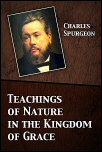
Each of Spurgeon’s sermons contains artful illustrations—many of which were drawn from nature. Spurgeon continually saw and experienced God’s providential work in nature, and frequently integrated creation themes into his preaching and writing. This volume contains addresses on creation, the Garden of Eden, planting and harvest, the seasons, and dozens more.
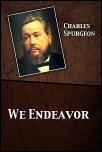
We Endeavor contains Spurgeon’s lectures to members of The Young People’s Society of Endeavour, a group devoted to service, honor, stewardship, and discerning the work of the Holy Spirit. In this volume, Spurgeon lectures on these themes with honesty about the cost of service and the gravity of God’s call. Christ never promised that following him would be easy, as the lives of the apostles and the history of persecution show.
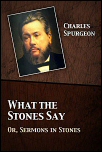
Spurgeon was a master illustrator. His sermons are full of vivid accounts and memorable illustrations which bring the message of the Gospel to life. In What the Stones Say, Spurgeon uses stones to illustrate the message of the Gospel. He draws from the imagery of stones in the Bible and the stories of stones in daily life. This volume also contains useful illustrations for preachers and teachers to use in their own ministries.
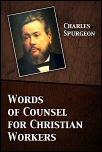
This volume is addressed to pastors, teachers, and others involved in the daily task of ministry. Spurgeon writes Words of Counsel for Christian Workers to help Christian leaders avoid the pitfalls of public life—pride and dishonesty, especially—and to encourage pastors through hardships. Spurgeon draws extensively from Scripture, focusing on the individuals in the biblical narrative who felt God’s call and rose to the challenge.
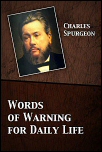
During his ministry on earth, Christ warned the world about the dire consequences of sin and the ramifications of rejecting the Son of God. Many believe in Jesus and are saved from sin; others face the wrath of God. In Words of Warning for Daily Life, Spurgeon confronts apathy and indifference among Christians, and offers practical—yet stern—advice on living well.

Words of Wisdom for Daily Living
- Publisher: Passmore and Alabaster
- Publication Date: 1896
- Pages: 205
Words of Wisdom for Daily Living contains concise stories and reflection on a variety of biblical, theological, and social topics. Spurgeon writes on pride and sloth, on economic issues, and on social issues such as capital punishment. Spurgeon’s advice displays a remarkable amount of intellect, wisdom, and wit.

The Greatest Fight in the World (Final Manifesto)
- Publisher: Passmore & Alabaster
- Publication Date: 1896
- Pages: 64
One of Spurgeon’s last addresses, The Greatest Fight in the World attained wide circulation and was immediately translated into multiple languages. Using the metaphor of battle, Spurgeon divides his address into three sections—one on armory, one on army, and one on the strength of the church. This volume, as one of Spurgeon’s last, fittingly expresses his zeal for doing the ministry of God for the service of the church.
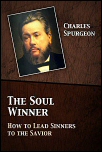
Spurgeon devoted more than forty years of preaching to the task of soul-winning. Taken from Spurgeon’s manuscripts, The Soul Winner contains lectures delivered on the subject to the students of Pastors’ College. The first six chapters contain the college lectures, along with four addresses delivered to Sunday school teachers, open-air preachers, and others gathered at the Monday evening prayer meetings at the Metropolitan Tabernacle.
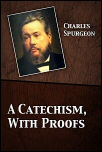
A Catechism, With Proofs
- Publisher: Passmore & Alabaster
- Publication Date: 1872
- Pages: 32
A Catechism, With Proofs is a manual compiled by Spurgeon and drawing from the Westminster Assembly and various Baptist catechisms. This catechism was used widely in Spurgeon’s congregation, and addresses the most pressing theological and pastoral needs of the church. The concise question-and-answer format makes this volume accessible for lay readers and scholars alike, and offers an insightful window into the faith of the congregation at the Metropolitan Tabernacle.
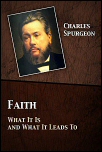
Faith: What It Is and What It Leads To
- Publisher: Passmore and Alabaster
- Publication Date: 1903
- Pages: 77
What is faith? The writer of Hebrews wrote at length on the subject, and generations of Christians have pondered this question—and its answers. Wrestling with faith and doubt are a natural component to Christianity, but what exactly is meant by the term ‘faith’? In this volume, Spurgeon weighs in. Faith: What It Is and What It Leads To includes chapters on the object of faith, the relationship between faith and reason, the ground of faith, the result of faith, and much more.
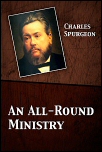
This volume contains Spurgeon’s addresses to the annual conference at the Pastor’s College, delivered each year from 1872 to 1890. Spurgeon regarded these conferences as his most important events of the year, and devoted significant time to preparing these addresses. These addresses represent the focal points of Spurgeon’s ministry of preaching and teaching. As such, An All-Round Ministry includes addresses on faith, individuality, strength in weakness, the evils of the current age, and more.
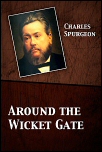
In this volume, Spurgeon uses a gate as a metaphor for Christianity—we are passing through, and ought to pause to reflect. Some of the most important ministry, after all, takes place before our very eyes. Spurgeon encourages his readers to awaken to the importance of their position in the world and realize the necessity of salvation for themselves and for others. This volume contains a series of reflections on that awakening: the exclusivity of salvation in Christ, faith in the person of Jesus, obstacles to belief, and more. Around the Wicket Gate also introduces readers to many of the themes developed in Spurgeon’s sermons and other works.
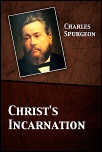
Christ’s Incarnation
- Publisher: Passmore & Alabaster
- Publication Date: 1901
- Pages: 152
Christ’s incarnation constitutes perhaps the most important event in God’s relationship with his creation. This volume contains expositions of key themes associated with Jesus birth. Spurgeon also writes at length on the work of salvation and the life of Jesus as the fulfillment of prophecy. He includes key Scripture texts on Christ’s work, and what the incarnation reveals about God.
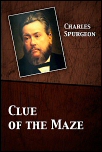
Clue of the Maze
- Publisher: Passmore & Alabaster
- Publication Date: 1892
- Pages: 128
The life of faith can be filled with uncertainty. Although we can be confident in our salvation, challenges arise. Clue of the Maze contains Spurgeon’s reflections on the challenges of Christianity, including a dozen reflections on doubt, uncertainty, and the various obstacles to Christian belief.
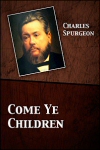
Come Ye Children
- Publisher: Passmore & Alabaster
- Publication Date: 1897
- Pages: 160
Jesus said, “Let the little children come to me,” and told his disciples that no one could enter the kingdom of heaven unless they did so “as a little child.” Scripture contains countless stories about children. In Come Ye Children, Spurgeon draws from the wisdom of Scripture and offers exposition on passages about children.
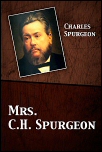
Mrs. C. H. Spurgeon
- Publisher: Passmore & Alabaster
- Publication Date: 1903
- Pages: 119
Charles Spurgeon’s wife had a profound effect on her husband’s ministry. This biography traces the events of her life, her influence on her husband, and her fundraising and charity efforts. This volume also contains excerpts from her correspondence and various autobiographical materials.
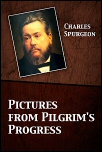
Pictures from Pilgrim’s Progress
- Publisher: Passmore & Alabaster
- Publication Date: 1903
- Pages: 237
John Bunyan’s Pilgrim’s Progress was undoubtedly Spurgeon’s favorite book. He read it more than a hundred times throughout this lifetime. This volume, Pictures from Pilgrim’s Progress collections Spurgeon’s various reflections and addresses on Bunyan’s important work. Some of this material first appeared in The Sword and the Trowel, also included in this collection; other material is unique to this volume. Pictures from Pilgrim’s Progress was compiled and edited by Thomas Spurgeon and published in 1903. Twenty chapters in all, this is a helpful volume of introductory material and commentary on Bunyan’s classic.
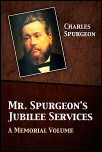
Mr. Spurgeon's Jubilee Services: A Memorial Volume
- Publisher: Passmore & Alabaster
- Publication Date: 1884
- Pages: 51
This volume records the events and addresses from Spurgeon’s Jubilee Service in 1884. It includes addresses by luminaries such as Dwight Moody, and received international attention.
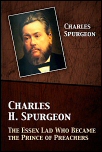
Charles H. Spurgeon: The Essex Lad Who Became the Prince of Preachers
- Author: James T. Allen
- Publisher: Pickering & Inglis
- Publication Date: 1893
- Pages: 62
This volume was one of the first of the numerous biographies of Charles Spurgeon to appear, and was written by James T. Allen the year of Spurgeon’s death. It recounts Spurgeon’s childhood years, his ministry, his rise to fame throughout the world, and the later years of his life.

Charles Haddon Spurgeon was born in Kelvedon, Essex, England on June 19, 1834. He converted to Christianity in 1850 at a small Methodist chapel, to which he detoured during a snowstorm. While there, he heard a sermon on Isaiah 45:22 and was saved—“Look unto me, and be ye saved, all the ends of the earth, for I am God, and there is none else.” He began his own ministry of preaching and teaching immediately, and preached more than 500 sermons by the age of twenty.
In 1854, at nineteen years of age, Spurgeon began preaching at the New Park Street Chapel in London. He was appointed to a six month trial position, which he requested be cut to three months should the congregation dislike his preaching. He gained instant fame, however, and the church grew from 232 members to more than five thousand at the end of his pastorate. Many of his sermons were published each week and regularly sold more than 25,000 copies in twenty languages. Throughout his ministry, Spurgeon estimated that he preached to more than 10,000,000 people. Dwight L. Moody was deeply influenced by Spurgeon’s preaching, and founded the Moody Bible Institute after seeing Spurgeon’s work at the Pastor’s College in London.
Spurgeon read six books per week during his adult life, and read Pilgrim’s Progress more than 100 times. In addition to his studying and preaching, Spurgeon also founded the Pastor’s College (now Spurgeon’s College), various orphanages and schools, mission chapels, and numerous other social institutions.
Charles Spurgeon suffered from poor health throughout his life. He died on January 31, 1892, and was buried in London.
Reviews
17 ratings

Chris Surber
11/28/2020

Faithlife User
2/8/2018

BillRiedel
2/20/2016
austinpayton83
1/4/2016
Spurgeon uses very flowery language and gives insight through his eyes on passages throughout scripture.
Mike Burner
1/31/2015

Phillip Johnson
1/12/2015

Richard Labelle
12/12/2014

John L. Jefferson
9/10/2014

David R Broom Jr
5/9/2014

